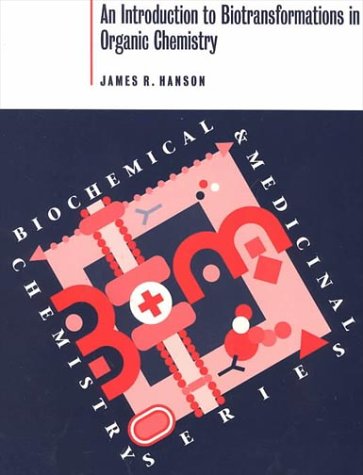Biochemical & Medicinal Chemistry S.
1 total work
An Introduction to Biotransformations in Organic Chemistry
by James R Hanson
Published 18 September 1997
This text is part of the "Biochemical & Medicinal Chemistry Series" Series Editor: John Mann, Professor of Organic Chemistry, University of Reading. The aim of this series of short textbooks is to present full accounts of topics which are at the interface of chemistry and biology, from medicinal chemistry to molecular biology. The topics chosen for inclusion are popular subjects for upper-level undergraduate and postgraduate modular courses, and yet they receive inadequate coverage in traditional textbooks of organic chemistry and of biochemistry. Each text in the series provides a concise and up to date introduction to its subject in an attractive format. Biotransformations utilize biological systems to carry out chemical transformations. The use of both isolated enzymes and whole organisms in biotransformations is considered. Such processes are playing an increasingly important role in both the research laboratory and in industry because biotransformations occur under mild, 'environmentally friendly' conditions and they have a selectivity which often differs from that encountered with syntheses using traditional laboratory reagents.
This accessible introduction to this growing field provides an up-to-date account of those situations in which biotransformations may present viable alternatives to purely chemical synthetic routes or be used in a complimentary manner to chemical reagents in a multi-step organic synthesis. Dr Hanson's concise introduction to this burgeoning field covers, in addition to enzymatic and microbial methods, the biotransformation of drugs in humans. It is suitable as a course text for advanced undergraduate and graduate students of chemistry and the biomedical sciences. No previous knowledge of biotransformations is assumed.
This accessible introduction to this growing field provides an up-to-date account of those situations in which biotransformations may present viable alternatives to purely chemical synthetic routes or be used in a complimentary manner to chemical reagents in a multi-step organic synthesis. Dr Hanson's concise introduction to this burgeoning field covers, in addition to enzymatic and microbial methods, the biotransformation of drugs in humans. It is suitable as a course text for advanced undergraduate and graduate students of chemistry and the biomedical sciences. No previous knowledge of biotransformations is assumed.
